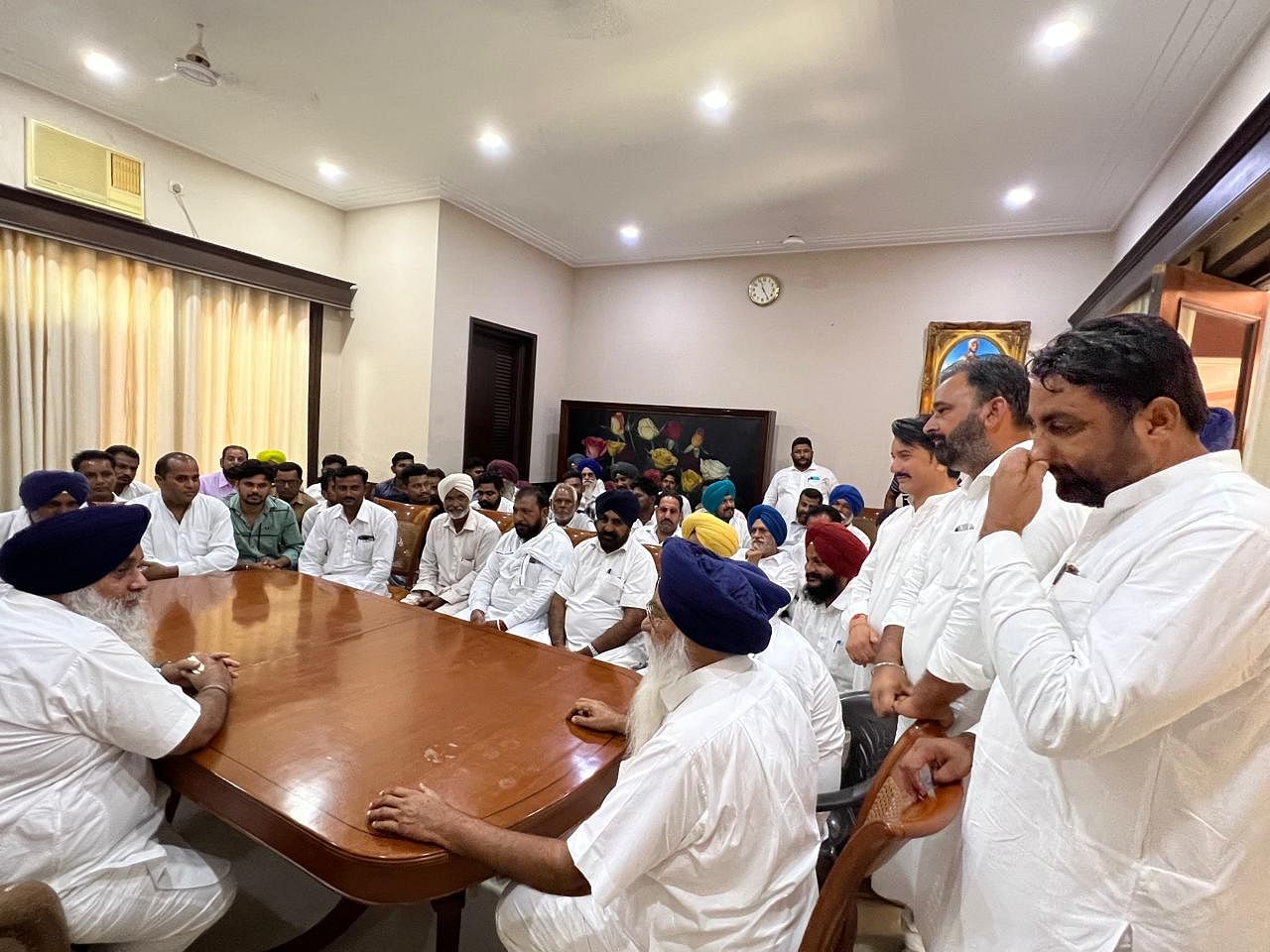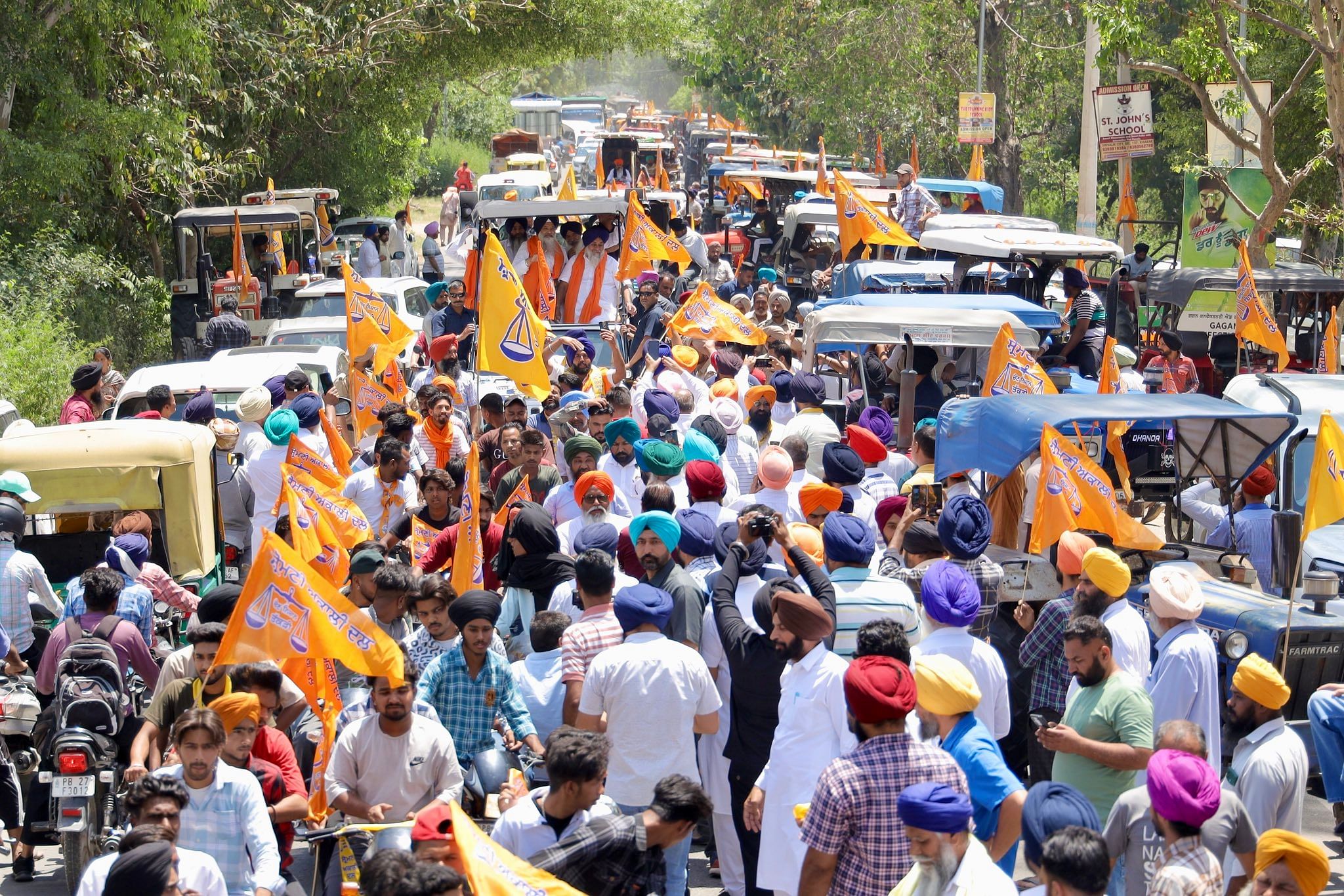Bathinda: It’s 10 am, and the fortress-like haveli of the Badals in Muktsar Sahib is bustling with activity. Leaders, workers, and supporters of the Shiromani Akali Dal (SAD) flit in and out of the grand red house with its high walls, tight security, and vast and verdant gardens as the party prepares for the Lok Sabha elections, with Punjab going to the polls on 1 June.
For the past seven years, the Badals have been out of power. And yet, the intense activities at the mansion — with its droves of supporters — give little indication of this.

It’s exactly this support from the average Akali worker that the family is now banking on to help turn its fortunes around.
For the SAD, which has been on an electoral downslide since 2017 — the year its two terms as the ruling party in Punjab ended — these elections could be the make-or-break battle for political survival.
“This time, there is enthusiasm among both the workers and the voters, and that is what makes it a win-win situation,” Harsimrat Kaur Badal, wife of party chief Sukhbir Singh Badal, a former Union minister and the current MP from Bathinda, tells ThePrint in an interview before embarking on a hectic day packed with public meetings. A three-time MP from Bathinda, Harsimrat is once again contesting from the seat.
However, SAD chief Sukhbir, the party’s MP from Ferozepur, has decided to sit this election out. “I have just completed three months of our ‘Punjab Bachao Yatra’ and am campaigning for other candidates,” he says in another interview with ThePrint.
No seat is a cakewalk for the SAD, which is facing a tough four-cornered contest on all 13, including bastions Bathinda and Ferozepur.
In Bathinda, Harsimrat will face Jeet Mohinder Singh Sidhu from the Congress, Gurmeet Singh Khuddia from the Aam Aadmi Party (AAP), and Parampal Kaur Sidhu from the Akali Dal’s former ally, the Bharatiya Janata Party (BJP).
Meanwhile, in Ferozepur, which has been in the Akali Dal kitty since 1998, the Akali Dal’s Nardev Singh Bobby Mann is up against AAP’s Jagdeep Singh Brar, Congress’s Sher Singh Ghubaya, and BJP’s Rana Gurmit Singh Sodhi.
For Sukhbir, son of the state’s six-time former chief minister Parkash Singh Badal, this election is a personal test of his leadership. It is his first full-scale parliamentary election without his father at the helm of the party and the BJP’s support. But he remains hopeful.
“You see, even at its worst, the vote share of the Akali Dal has been the same as the Congress. This is because, in every village across Punjab, there is an undying network of the Akali Dal,” he tells ThePrint, adding that this time, his party’s vote share will be “the highest among all parties”.
In the 2012 assembly elections, the SAD vote share was 34.73 percent. This went down to 26.37 percent in the 2014 Lok Sabha elections, and 25.24 percent in the 2017 assembly polls. Although the party did marginally better in the 2019 general elections at 27.45 percent, it plummeted to a low of 18.38 percent in the 2022 assembly polls.
In contrast, rival Congress had secured 40.09 percent of the votes in the 2012 assembly elections, 38.5 percent in 2017, and 23 percent in 2022. It also secured 33.19 percent of the votes in the 2014 Lok Sabha polls, which went down to an abysmal 4.12 percent in 2019.
‘Dilli wali partiyan vs Tuhaadi Punjabi party’ — SAD’s ‘us vs them’ rhetoric

For the SAD, this election is not only a fight for seats in the Lok Sabha but will set the tone for the party’s bid for power in the 2027 assembly elections. The party campaign is riding on four keywords — “regional, secular, progressive, and pro-poor”.
The Akali Dal is also pitching itself as the only regional party in the fray against the three national parties: “Tuhaadi apni Punjabi party (your own Punjabi party)” versus “Dilli wali partiyan (parties from Delhi)” has been its prime refrain for several months now.
Harsimrat says, “Whether it’s Punjab’s claim to Chandigarh as capital, whether it’s Punjab’s river waters, construction of the Sutlej-Yamuna Link canal, protesting farmers or our religious mattersm a strong regional party is required to represent Punjab at the Centre”.
At an election meeting in Moga, Sukhbir makes exactly this appeal.
“These Dilli wali parties want to win the elections because they want power at the Centre,” he says. “While we, your own party that has served Punjab for 15 years, want to win the election so that we can talk about your issues and problems at the Centre.”
The party uses a similar pitch at other meetings as well. At Dharamkot, which also comes under the Moga district, Sukhbir accuses AAP of “working in collaboration with the Centre”.
“Punjab’s interest will be sold out to them. In the last seven years, the two governments (the Punjab government, first under Congress and then AAP, and the BJP-led Narendra Modi government at the Centre) that have been in power have taken Punjab’s income to the Centre to strengthen their parties. Only a party from Punjab will use the state’s income within the state,” he says.
This “us versus them” rhetoric has only sharpened after the party’s last-ditch effort to patch up an alliance with the BJP fell through earlier this year.
During the last parliamentary polls — when the two parties were still allies — the SAD had contested 10 seats, leaving the remaining three for the BJP. However, while the Akali Dal could only manage two seats, the BJP swept up two of the three it contested and secured almost 10 percent of the vote share.
The SAD manifesto released Sunday also talks about a strong federal structure.
“The central government collects taxes from the states and while giving these taxes to the states, which is their right, they demand their pound of flesh, which is most unfair. We will continue to fight for a stronger federal structure for the states and join hands with other regional parties,” Sukhbir had said while releasing the party manifesto earlier this week.
The manifesto also talks about zero tolerance for interference by the Centre in the religious affairs of the Sikhs.
Meanwhile, countering what he believes is the BJP’s move to polarise voters in Punjab into Hindu and Sikh, Sukhbir has declared his party as completely secular.
“We have two Hindu Brahmin candidates contesting from Amritsar and Patiala. Our gurus did not differentiate between any religions. Our ninth guru gave up his life to safeguard the Hindu religion. There are parties who are going to divide people but we are for brotherhood,” Sukhbir tells the crowd at Moga, adding that his father, the late Parkash Singh Badal, “not only worked for the beautification of the Golden Temple but also for the Durgiana Mandir and the Balmiki Temple”.
Last week, Sukhbir created a sensation when he alleged that Sikh separatist Amritpal Singh was a “nominee of the Centre” planted by the BJP to contest the parliamentary elections to polarise votes.
Amritpal, a radical preacher who has been espousing the cause of Khalistan — or a separate Sikh nation — is an independent candidate from the Khadoor Sahib seat. His candidature was cleared by the authorities in Assam and the Election Commission without any hurdles.
Significantly, SAD’s stand is at complete variance with the one taken by the Shiromani Gurdwara Parbandhak Committee (SGPC) — the Sikh religious body the SAD runs through its elected members. The SGPC has been speaking out against Amritpal’s incarceration in the Dibrugarh jail in Assam under the National Security Act.
‘Experimental Punjabis’
During its poll pitches, SAD has also been making a strong case for being the only party that led the state to progress when it was in power for 10 years.
“The roads that you see, infrastructure, buildings, airports, all work was completed during our regime. There has not been a single development work carried out during Captain Amarinder’s time of five years and now two years of Bhagwant Mann,” says Sukhbir at the Moga rally.
He is also quick to remind the audience about the pro-poor welfare schemes started by his father as chief minister.
“Did you not get Atta Dal (SAD-BJP’s Atta-Dal scheme) during our period? Did the old get pensions? Did the girls of marriageable age not get Shagun (under the Badal government’s Shagun Scheme)? Did we not give 200 units of power free? Did the SC students not get any scholarships?”
Punjabis, he tells an election gathering at Dharamkot, have an “experimental nature and want to try everything new”.
“In giving a chance to a new party, they wasted five years of their lives. Look at Gujarat — the people there are much wiser than us. For the past 25 years, they have been happy with the party in power, giving it a chance to develop the state and help it progress,” he concludes.
(Edited by Uttara Ramaswamy)
Also Read: Six reasons Dalits in Haryana are worried about losing reservation if Modi returns with ‘400 paar’













